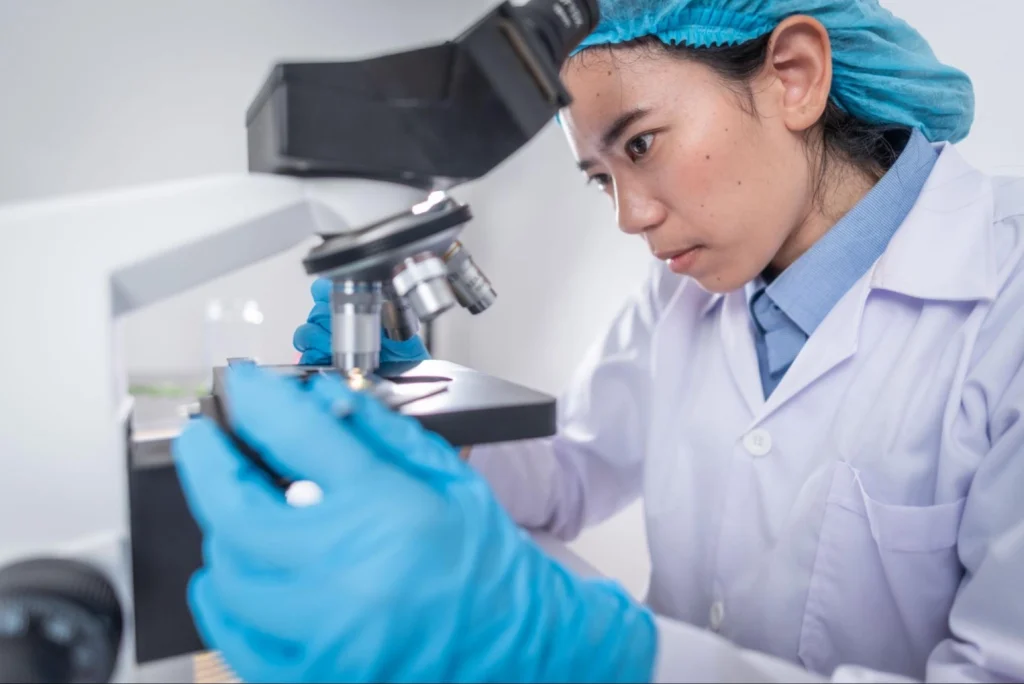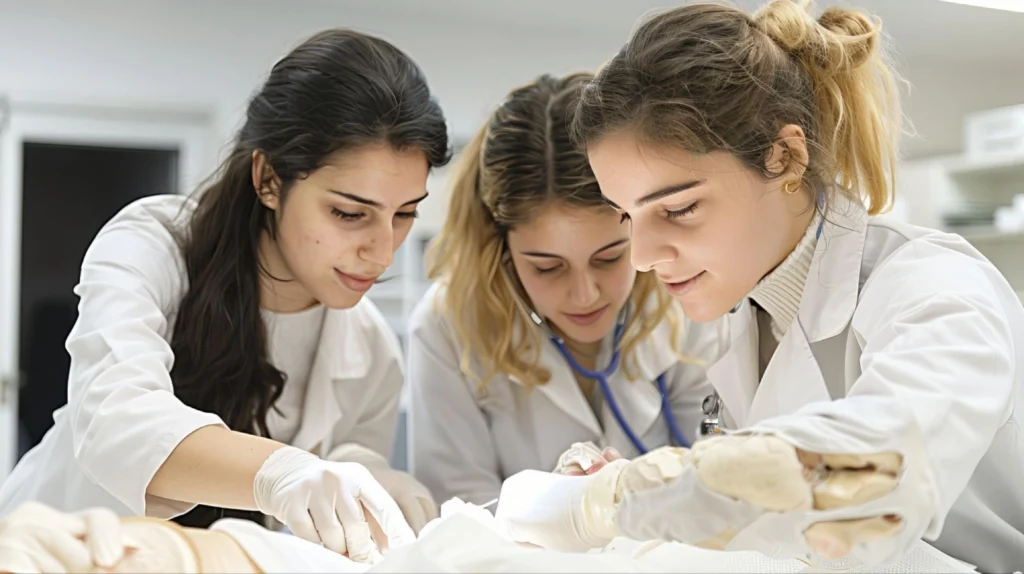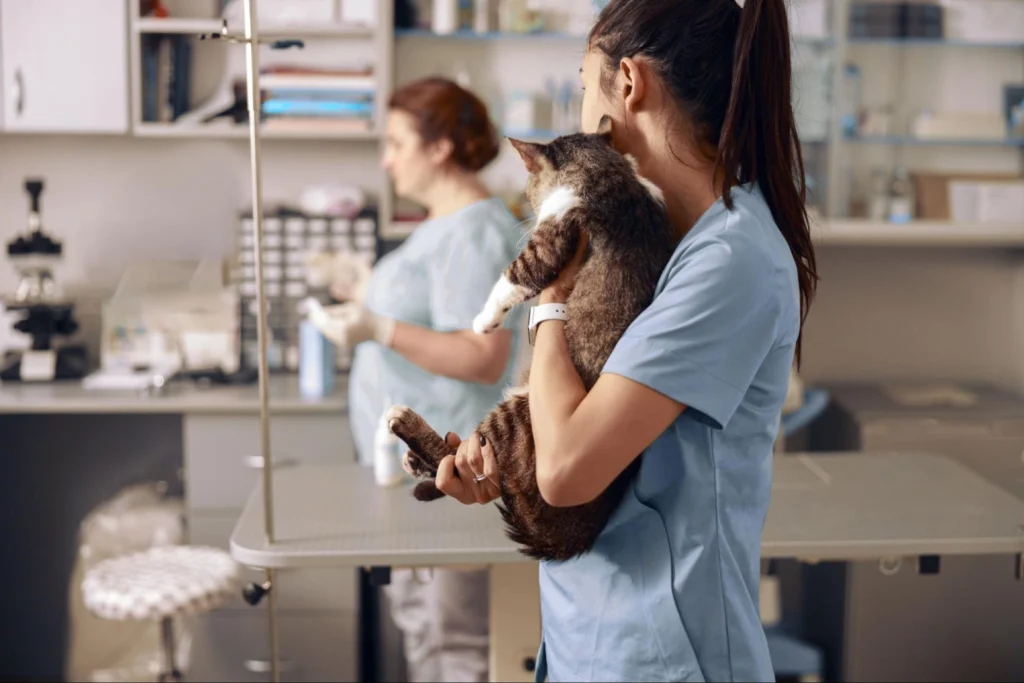About the Writer
A Guide to Vet School Requirements by Program

Veterinary school admissions are built around several core components: prerequisite coursework, GPA, standardized tests, veterinary experience, and more. Understanding what each program expects is essential to submitting a competitive application.
That’s why, in this guide, we will break down the vet school requirements by program so you can confidently check off every box and stay on track toward your future in veterinary medicine. Below are the top veterinary medicine institutions we’ll cover:
- Texas Tech University
- Purdue University
- University of Georgia
- North Carolina State University
- University of California Davis
- Cornell University
- Ohio State University
- Texas A&M University
- University of Florida
- University of Wisconsin
- University of Minnesota
- Iowa State University
- Washington State University
- Colorado State University
- Oregon State University
Let’s dive in and explore what each of these top veterinary schools looks for in future students – so you can align your goals, qualifications, and application strategy accordingly.
Understanding Vet School Requirements
Before we dive in, let’s clarify a few things you need to know to be prepared when applying to veterinary school.
Is the GRE Still a Vet School Requirement?
The GRE (Graduate Record Examination) used to be a standard part of applying to veterinary school.
Many programs have dropped the GRE requirement. The test has proven to be poor at reflecting how well a student will do in vet school and has shown systemic bias in evaluating applicants from different backgrounds.
If a school still accepts GRE scores, submitting one may help your application if your score is strong. However, most admissions decisions are now more focused on your GPA, completion of prerequisite courses, letters of recommendation, and personal statement.
What are the Prerequisite Course Requirements for Vet School?
Veterinary schools often require applicants to complete certain prerequisite courses before applying. These requirements are typically measured in two ways:
- By specific courses (e.g., General Chemistry 1 with lab)
- By total credit hours in a subject area (e.g., 6 semester hours of English)
Other programs might require specific courses with lab components and have rules about how recently science courses must have been taken.
Courses usually must be completed with a grade of C or better at the undergraduate level, and often by the end of the spring term before you begin vet school in the fall.
Finding Out More About Current Vet School Admissions Criteria
Veterinary school admissions requirements can vary widely by program and often change from year to year. These requirements may include specific prerequisite courses, required credit hours, experience expectations, tests, and more.
For the most accurate and up-to-date information, it’s best to visit the official admissions or prerequisite course page for each school you’re interested in.
For now, here’s a summary of the key information we’ve gathered from top vet school DVM programs in the US to help you get started:
Texas Tech University – DVM
The DVM program at Texas Tech University emphasizes community-based experiential learning.
The first three years are spent on the Amarillo Campus and Mariposa Station, while the fourth-year clinical experience takes place in a community-based Clinical Learning Network, mainly in Texas. The program focuses on primary veterinary care to help prepare graduates to practice veterinary medicine.
- Minimum GPA: 2.90
- Prerequisite Courses: Animal Nutrition – 3 credits
Biochemistry – 3 credits
English – 3 credits
General Biology with Laboratory – 4 credits
General Microbiology with Laboratory – 4 credits
Genetics – 3 credits
General Chemistry 1 with Laboratory – 8 credits
General Chemistry 2 with Laboratory – 8 credits
Introductory Statistics – 3 credits
Organic Chemistry with Laboratory – 4 credits
Physics – 4 credits
- Minimum Grade: C
- Experience: The average accepted student has 3,105 animal experience hours, with 2,073 of those being under veterinary supervision.
- Other: The admission committee considers each applicant’s life experiences with activities supporting rural and regional communities.
Purdue University – DVM
The DVM program at Purdue University provides a comprehensive education with a focus on practice-readiness.
The first two years cover foundational sciences with hands-on learning. In the third year, students focus on diagnosis and treatment, with courses in small animal primary care and food animal medicine. The fourth year consists of 17 clinical rotations, where students specialize in tracks like small animal, equine, or food animal.
- Minimum GPA: 3.10
- Prerequisite Courses: General Chemistry 1 with Laboratory
General Chemistry 2 with Laboratory
Organic Chemistry 1 with Laboratory
Organic Chemistry 2 with Laboratory
Biochemistry (upper division)
General Biology 1 with Laboratory
General Biology 2 with Laboratory
Genetics
Microbiology (general or medical) with lab
Physics 1 with Laboratory
Physics 2 with Laboratory
Statistics
English Composition
Communication
Humanities
- Minimum Grade: C-
- Experience: Animal experience, research experience, and veterinary experience are all considered in the application process.
- Other: To qualify for financial aid as a professional student, applicants must have a bachelor’s degree or at least 72 college credits before being admitted.
University of Georgia – DVM
The University of Georgia, founded in 1785, is the oldest public university in the United States. Its DVM program follows a four-year curriculum designed to build knowledge in veterinary science, hands-on clinical skills, and professional development.
The first two years cover core body systems in both healthy and diseased animals, followed by clinical reasoning, surgery, and electives in the third year. The final year is devoted to full-time clinical rotations, where students can focus on small animals, large animals, or a mixed-animal track.
- Minimum GPA: 3.00
- Prerequisite Courses: English (6 hours)
Humanities or Social Studies (14 hours)
General Biology with Laboratory (8 hours)
General Chemistry with Laboratory (8 hours)
Organic Chemistry with Laboratory (8 hours)
Physics with Laboratory (8 hours)
Biochemistry (3 hours)
Advanced biology (8 hours)
- Minimum Grade: C
- Experience: Applicants need a minimum of 250 hours of veterinary experience, completed by the time they submit their VMCAS application. The experience must be under the direct supervision of a veterinarian. Otherwise, it’s considered general animal experience.
- Other: N/A

North Carolina State University – DVM
North Carolina State University’s College of Veterinary Medicine DVM program focuses on hands-on clinical training and medical science.
The curriculum aims to develop students’ medical knowledge, clinical skills, and global awareness. The program aims to push students to be independent learners and demonstrate honesty, integrity, and open-mindedness in their careers.
- Minimum GPA: 3.00 for North Carolina residents and 3.40 for non-residents.
- Prerequisite Courses: Animal Nutrition
Biochemistry
Biology with Laboratory
General Chemistry with Laboratory
Organic Chemistry with Laboratory
English Composition & Writing or Public Speaking or Communications
Genetics
Humanities and Social Sciences
Microbiology with Laboratory
Physics with Laboratory
Statistics
- Minimum Grade: C-
- Experience: A minimum of 200 hours of clinical, medical, agribusiness, health science, or medical-related scientific research experience is required.
- Other: An animal nutrition course is required for admission and can be completed through online learning from an accredited college or university.
University of California Davis – DVM
The UC Davis School of Veterinary Medicine DVM program combines academic study with clinical skills training for around 600 students. The curriculum begins with a general foundation in comparative veterinary medicine, followed by species-specific tracks such as small animal, large animal, or equine.
UC Davis is considered as one of the best vet schools in the nation and was a recipient of the 2024 Health Professions HEED Award for its efforts in fostering a diverse and inclusive educational environment.
- Minimum GPA: 2.50
- Prerequisite Courses: College Physics
General Biology with Laboratory
General Chemistry with Laboratory
Organic Chemistry with Laboratory
Statistics
Biochemistry with Metabolism
Genetics
Systemic Physiology
- Minimum Grade: C
- Experience: Minimum 180 hands-on veterinary experience hours. (Online experience does not count).
- Other: Applicants must have a bachelor’s degree in any subject from a regionally accredited university.
Cornell University – DVM
Cornell University’s DVM program has built a student-centered, problem-based curriculum designed to support critical thinking and early clinical development. Faculty take a role as facilitators and guide students through real-world learning experiences across different animal settings.
The program encourages collaboration, self-directed learning, and exposure to a wide range of veterinary practice areas from the students’ first year.
- Minimum GPA: Not specified, but a minimum 3.70 GPA is required for early acceptance consideration
- Prerequisite Courses: English Composition/Writing Intensive – 6 credits
Biological Science with Laboratory – 6 credits
General Chemistry with Laboratory – 6 credits
Organic Chemistry – 3 credits
Biochemistry – 4 credits
Advanced Life Science – 3 credits
Physics with Laboratory – 6 credits
- Minimum Grade: C-
- Experience: No minimum hours are required, but veterinary and animal experience are recommended.
- Other: Research experience, community involvement, and any significant non-academic interests and abilities are also considered in the application process.

Ohio State University – DVM
Each year, 165 students are admitted into Ohio State University’s DVM Program, which is a four-year course of study that follows three to four years of pre-professional education.
Ranked 3rd among North America’s veterinary schools, Ohio State’s College of Veterinary Medicine is home to the largest Veterinary Medical Center in the US, featuring a Clinical Trials Office that leads in advanced treatments.
- Minimum GPA: Not specified.
- Prerequisite Courses: Biochemistry
Microbiology With Laboratory
Physiology
Communication
Science Electives
Humanities/Social Science Electives
- Minimum Grade: C or higher with a B average
- Experience: Animal, veterinary, and work experience are considered in the admissions committee review.
- Other: The subjective evaluation (accounts for 60% of the applicant selection decision) consists of a 30-minute interview, including behavioral and situational judgment questions. Applicants’ interpersonal and communication skills are also assessed.
Texas A&M University – DVM
The Texas A&M University DVM program is one of the oldest of its kind in the US and was ranked in the top five of vet schools according to the US News & World Report.
In the first year, students focus on foundational courses like animal care, anatomy, physiology, and immunology. Then, the second year covers topics in pathology, pharmacology, and public health. The third year introduces specialized tracks and clinical diagnostics, and finally, the fourth year focuses on clinical rotations.
- Minimum GPA: 2.90 Overall
3.10 for the last 45 semester hours
2.90 science
- Prerequisite Courses: General Biology with Laboratory – 4 credits
General Microbiology with Laboratory – 4 credits
Genetics – 3 credits
Animal Nutrition Or Feeds & Feeding – 3 credits
General Chemistry with Laboratory – 8 credits
Organic Chemistry with Laboratory – 8 credits
Biochemistry – 3 credits
Statistics – 3 credits
Physics with Laboratory – 4 credits
English – 3 credits
Public Speaking – 3 credits
- Minimum Grade: C
- Experience: Applicants must have more than 100 hours worth of veterinary experience to qualify for an interview.
- Other: Applicants must complete CASPer (An online, open-response situational judgment test).
University of Florida – DVM
The University of Florida’s College of Veterinary Medicine was ranked #5 nationally by US News & World Report.
In the DVM program, students are trained to become future veterinarians while providing advanced care to animal patients from across the Southeast at UF Veterinary Hospitals. The college also leads innovative biomedical research and revolves around advancing the science of animal, human, and environmental health.
- Minimum GPA: There is no minimum requirement, but a GPA of 3.00 or higher is recommended.
- Prerequisite Courses: Biology 1 with Laboratory – 4 credits
Biology 2 with Laboratory – 4 credits
Microbiology 2 with Laboratory – 4 credits
Genetics – 3 credits
Chemistry 1 with Laboratory – 4 credits
Chemistry 2 with Laboratory – 4 credits
Organic Chemistry 1 with Laboratory – 4 credits
Organic Chemistry 2 with Laboratory – 4 credits
Biochemistry 1 with Laboratory – 3 credits
Physics 1 with Laboratory – 4 credits
Physics 2 with Laboratory – 4 credits
Statistics – 3 credits
- Minimum Grade: C
- Experience: No minimum hours required.
Recommended: 10+ months of continuous veterinary/clinical experience at one location.
A variety of veterinary experiences to understand the field’s scope.
Paid experience is preferred, but shadowing and volunteering are also acceptable.
- Other: N/A
University of Wisconsin – DVM
The University of Wisconsin’s DVM program provides students with a broad veterinary education and skills for plenty of different career paths, including private practice, academia, research, industry, and government services.
The program emphasizes veterinary medicine’s role in food animal production, public health, and the managerial skills which are important for operating a practice later in student’s careers.
- Minimum GPA: Not specified
- Prerequisite Courses: General Biology or Zoology – 4 – 5 credits
Genetics Or Animal Breeding – 3 credits
General And Qualitative Chemistry – 8 credits
Organic Chemistry – 3 credits
Biochemistry – 3 credits
General Physics – 6 credits
Statistics – 3 credits
English Composition Or Journalism – 6 credits
Social Sciences OR Humanities – 6 credits
- Minimum Grade: C
- Experience: Animal and veterinary medical experience is considered but not required.
Other: Non-academic factors account for 40% of the application evaluation criteria. This includes communication skills, leadership potential, maturity, goal orientation, awards and honors, background, and special circumstances.

University of Minnesota – DVM
The DVM program at the University of Minnesota prepares students for leadership roles in veterinary medicine, focusing on animal health, public health, and environmental well-being.
The program culminates in 13 months of clinical rotations at the Veterinary Medical Center, where students develop essential veterinary skills. With over 65 rotation options, students can explore a wide range of specialties, such as Acupuncture and Zoological Medicine.
- Minimum GPA: 2.75
- Prerequisite Courses: English – 6 – 10 credits
Algebra or Higher Mathematics – 3 – 5 credits
Statistics – 3 – 5 credits
General Chemistry with Laboratory – 6 – 10 credits
Organic Chemistry – 3 – 5 credits
Biochemistry – 3 – 5 credits
Biology with Laboratory – 6 – 10 credits
Genetics – 3 – 5 credits
Physics – 6 – 10 credits
Liberal Education – 9 – 12 credits
- Minimum Grade: Not specified
- Experience: Applicants must provide at least one letter of recommendation from a veterinarian who can document their veterinary experience.
- Other: Priority is given to residents of Minnesota and North Dakota.
Around 90% of students entering the program each year have completed a bachelor’s degree, although it is not a requirement for admission.
Iowa State University – DVM
Iowa State University’s DVM program is a four-year curriculum with three years of pre-clinical instruction followed by a final year of clinical training at the Lloyd Veterinary Medical Center. The program prepares graduates to be practice-ready across a broad range of species.
- Minimum GPA: Cumulative Undergraduate: 2.50
Required Science: 2.80
Last 45 Credit: No minimum required
- Prerequisite Courses: English Composition – 3 credits
Oral Communication – 3 credits
General Chemistry 1 with Laboratory – 4 credits
General Chemistry 2 – 3 credits
Organic Chemistry 1 with Laboratory – 4 credits
Biochemistry – 3 credits
Physics 1 with Laboratory – 4 credits
General Biology 1 with Laboratory – 4 credits
General Biology 2 with Laboratory – 4 credits
Anatomy and/or Physiology – 3 credits
Genetics – 3 credits
Upper-Division Biomedical Science Coursework – 9 credits
Arts, Humanities, Social Sciences – 6 credits
Electives – 8 credits
- Minimum Grade: No specific grade requirement is listed beyond the GPAs.
- Experience: Veterinary, animal, or research experience is recommended.
At least 200 hours of quality experience is expected.
Experience can be voluntary or paid.
- Other: Students must complete CASPer and the ISU Supplemental Application.
Washington State University – DVM
Washington State University’s DVM program includes case-based learning, simulation-based education, and early clinical exposure.
Over the past 10 years, the program has maintained a 97% average pass rate on the North American Veterinary Licensing Examination (NAVLE).
- Minimum GPA: No minimum GPA is required.
- Prerequisite Courses: Biology with Laboratory – 8 credits
Inorganic chemistry with Laboratory – 8 credits
Genetics – 3 credits
Biochemistry – 3 credits
Two Upper-Division Biomedical Science Courses – 6 credits
Physics with Laboratory – 4 credits
Statistics– 3 credits
Algebra Or Pre-Calculus – 3 credits
English Composition Or Communication – 3 credits
Arts & Humanities Or Social Science Or History – 3 credits
- Minimum Grade: C-
- Experience: Experiences in veterinary, animal, employment, research, volunteer/community service, and extracurriculars are considered.
- Other: Applicants must answer general essay questions.
Colorado State University – DVM
Colorado State University’s DVM program is supported by four academic departments and over 25 veterinary specialties. Students gain experience through the university’s veterinary teaching hospital, which sees over 45,000 patient visits annually.
CSU is consistently ranked among the top veterinary schools in the country, currently #3 according to US News & World Report.
- Minimum GPA: Not specified.
- Prerequisite Courses: Biological sciences with Laboratory – 1 credit
Genetics – 3 credits
Cell Biology – 3 credits
Systems Physiology or Anatomy
Physiology 1 – 3 credits
Physiology 2 – 3 credits
Additional Upper-Division “Biomedical Science” Courses – 9 credits
Chemistry with Laboratory – 1 credit
Biochemistry – 3 credits
Physics with Laboratory – 4 credits
Statistics – 3 credits
English Composition – 3 credits
Arts and Humanities/Behavioral and Social Sciences – 12 credits
Electives – 15 credits
- Minimum Grade: C-
- Experience: Not required.
- Other: N/A
Oregon State University – DVM
The DVM program at Oregon State University focuses on core training in comparative biology and medicine, covering primary clinical disciplines and domestic animal species.
It also offers elective opportunities in specialized areas such as zoos, exotics, wildlife medicine, marine sciences, and clinical nutrition. Other areas include various clinical specialties, such as cardiology, oncology, theriogenology, anesthesiology, internal medicine, and surgery.
- Minimum GPA: 3.00 for non-residents (The average GPA of admitted students is 3.50 – 3.80.).
- Prerequisite Courses: Biology
Advanced Biological Sciences with Laboratory
Physics
General Chemistry with Laboratory
Organic Chemistry
Biochemistry
Genetics
Mathematics
Physiology
Statistics
English
Public Speaking
Humanities/Social Sciences
- Minimum Grade: C-
- Experience: There is no minimum number of hours to apply, but applicants with at least 400 hours of veterinary experience will be more competitive.
Other: There is no expiration date on prerequisite coursework.

Finding Your Perfect Fit with Vetucore
When looking at vet school requirements, there can be a lot of information to take in. With each program having varying criteria, you might end up feeling overwhelmed when trying to figure out where you stand.
Fortunately, finding the right DVM program doesn’t have to be a headache! If you need personalized guidance during the application process, our dedicated consultation service is here to help.
Once you’re ready to explore your options, our VetMed Match tool makes it easy. Just enter details like your GPA and residency state and get started!
From there, you can move forward with evaluating cost of tuition and financial aid options and submitting your applications confidently. At Vetucore, we’ll be happy to be by your side the entire time!
